From all over the world, the water gods are gathering. They’re attending the very important Water Conference (which might actually just be a pool party). For a few hours, they’ll discuss their legends, family ties, and the violent sea storms they often lord over.
Since they can’t float in the pool and pour a piña colada at the same time, mortals have been summoned as waiters. You can get out of jury duty but there’s no way you can get out of this one.
That being said, things really aren’t so bad. You’re allowed to eat all the cocktail garnishes you want and you can spend time talking to each water god in person; pet monsters and all.
Table of Contents
Greek Gods of Water and the Sea
There are Greek gods and goddesses for nearly everything, including several who ruled over the water and the sea. Here are some of the most significant from all of the Greek mythology:
Poseidon — Greek God of the Sea and Water

- Religion: Greek mythology
- Realms: God of the sea, earthquakes, and horses
- Family: Son of Cronus and Rhea; brother of Zeus
- Fun fact: Poseidon was credited with the creation of the horse
One of the moodiest water gods out there, and the most famous of all the Greek sea gods, is Poseidon, also known as the god of the sea. Nobody knows what his problem is but everybody’s got a theory.
Some say he’s still angry because his father, Cronus, swallowed him whole as a baby. Others believe it’s because Poseidon is kind of a middle child — his parents had a cluster of kids and he was the second son. Maybe it’s because he lost Athens to the goddess Athena when the citizens loved her offering of an olive tree more than his present of a saltwater stream pooling inside a temple.
Then again, he could be steamed because he failed to dethrone his brother, Zeus, who, as punishment, made Poseidon serve the Trojan king, Laomedon. But whatever it is that curdles his milk, this sea god is a violent character.
Poseidon’s need for feuds is why his invitation to this pool party of the gods… you know, “got lost in the mail.” But Poseidon’s no fool. He knows he’s not wanted.
As the Greek god of the sea and earthquakes, Poseidon tries shaking and flooding the walls surrounding the party. No such luck, some collective sacred mojo is protecting the perimeter. Then he tries digging under the wall with his trident. No luck there, either. His tantrum isn’t getting him anywhere.
READ MORE: Poseidon’s Trident: A Legendary Weapon of the Sea God
He screams in anger — a noise described by Homer as being louder than a thousand men yelling together — but nobody can hear him because the music’s too loud.
Hydros — Greek Titan Water God
- Religion Greek Mythology
- Realms: Primordial waters
- Family: Born without parents; married to Gaia and Thesis; father of Gaia, Ananke, and Chronos
- Fun fact: His name means “water”
A chlorinated pool isn’t suitable to receive the many sea gods at this conference. Only VIP water will do. This is where Hydros comes in — this Greek god is busy filling the pool with primordial H2O and he has an endless supply.
READ MORE: Who Invented Water? History of the Water Molecule
Hydros is kind of like a rooster still living in his egg. According to mythology, he was born at the moment of creation and hung around in the primordial waters. Eventually, it became his permanent realm.
He might be a homebody, but his children — Cronus and Ananke — created the world. Forget cute toddlers. Hydros had offspring with serpentine coils which they used to crush the cosmic egg. And from that egg came Life that split into Air, Earth, Heaven, and Sea.
Hydros gives you a thumbs up to show that the pool is full. You close the valve on his water truck and sigh. It’s going to be a weird day.
Ceto — Sea Goddess from Ancient Greece
- Realms: Water, dangerous sea creatures
- Religion: Greek Mythology
- Family: Child of Pontus and Gaea; married to her brother Phorcys; the mother of a menagerie of terrifying children
- Fun fact: Her mother Gaea was also her grandmother
By now most of the other guests have arrived. You’re assigned to another god of the sea, who is in charge of the entertainment. But her show turned out to be a blood sport, and Ceto suddenly doesn’t look so benevolent anymore.
Resembling a water demon and an evil sea god at this point, she releases several wet pets to chase the waiters. You thank your lucky stars that you’re holding the leashes of the rest of the monsters and are thus saved from the melee. After a few minutes, she calls off the dogs. Well — the sharks, dragons, sea monsters, and all the other sea creatures she controls that glide through the world’s waters. Thankfully nobody got hurt.
This Greek goddess is known for her power to control these beasts, but she has no desire to curb their lethal potential. She controls them to unleash chaos.
You’re almost too scared to slowly turn your head to look at her family. Her kids are standing next to you, still cackling in glee over the Monsters Versus Mortals game. Ceto looks like a cupcake in comparison — one is a giant crab, and then there’s a vicious dragon and a serpent with a hundred heads.
READ MORE: Snake Gods and Goddesses: 19 Serpent Deities from Around the World
Glaucus — Fisherman’s Sea God
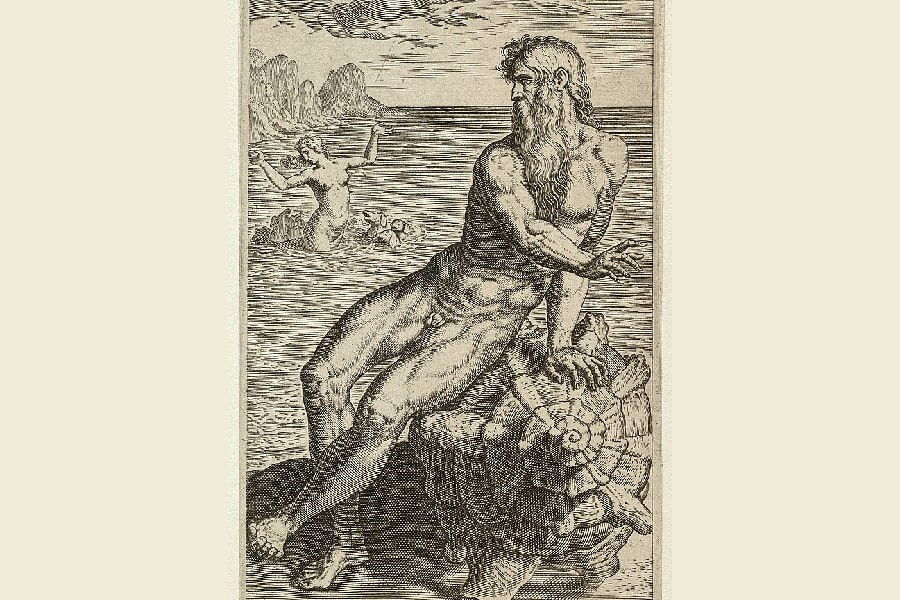
- Religion: Greek Mythology
- Realms: The sea, fishermen, prophecy
- Family: Sources argue over this one, but his father might’ve been Poseidon
- Fun fact: After he mastered the art of prophecy, he became Apollo’s teacher
Glaucus feels sorry for you. He pulls you aside and shoves a stiff Martini into your hand. As it turns out, this young sea god can see things from a mortal’s point of view. Glaucus himself used to be a normal human being, but one day — after swallowing a magical herb — he was transformed into a god of the sea.
But that hadn’t really been the plan. In fact, Glaucus just wanted his slice of immortality. When his heart was still beating on borrowed time, he was a fisherman. At one point, he realized that a certain plant brought dead fish back to life, so he ate some.
He tells you all about how things went downhill from there — he sprouted a tail and fins, and so had to take all of his furniture and move to the sea. At least Glaucus made good friends there. Major ocean deities taught him the art of prophecy and he became a fisherman’s sea god.
Glaucus is in charge of the barbeque stand, but he keeps frying the same fish over and over. Once a god leaves with a filet, he brings the creature back to life and grills it again. Maybe you should call Fish Welfare.
Oceanus — God of the River Okeanos
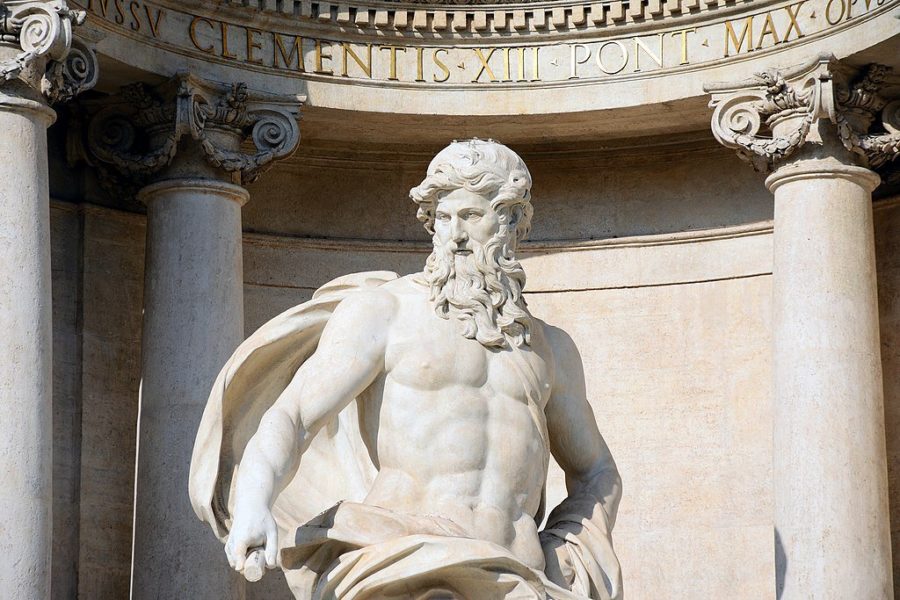
- Religion: Greek mythology
- Realms: God of the River Okeanos
- Family: Married to Tethys — their children became the gods and nymphs of rivers, fountains, and springs
- Fun fact: He didn’t help his brothers (Zeus, Hades, and Poseidon) to overthrow their father so that Zeus would become king of Mount Olympus
READ MORE: The 12 Olympian Gods and Goddesses
It’s hard to imagine, but Oceanus is the full brother of several violent and power-hungry Greek gods. He’s just a quiet guy, sitting in his flip-flops near the pool and nodding his head to the beat of the DJ. His wife and children are nearby and, as a family, they run a vast freshwater empire.
Oceanus controls the River Okeanos, which encircles the Earth. According to mythology, this river is the source of all freshwater on the planet. His significant other, Tethys, is often believed to ferry it through underground aquifers.
The friendly couple introduces you to their offspring. One batch is called the Potamoi — they’re male river gods with horns and tails that are both snake and fish-like. The girls are called the Oceanids, and they are the nymphs in charge of fountains and springs.
Hindu Water Gods
Another religion with lots of deities, Hinduism has several sea gods. Here are some of the Hindu gods and goddesses invited to this pool party:
Ganga — Ganges River God and Hindu Water Goddess

- Religion: Hinduism
- Realms: Mercy, health, cleansing, the river Ganges, water
- Family: Daughter of Brahma; married to Shiva
- Fun fact: Yellow items are among the symbols of this water goddess
READ MORE: The 10 Most Important Hindu Gods and Goddesses
Some people steal hotel towels. Others pinch the complimentary sugar sachets. Ganga, on the other hand, loves taking sins. What she does with all these troubles is anyone’s guess. The point is that followers of Hinduism aren’t complaining — not every culture is blessed with a goddess that wipes the slate of several lifetimes clean with a single drop of Ganga water.
For this reason, she’s not only a goddess of water but also the ultimate mother of mercy. She is celebrated in the spring when believers gather at her sacred river — the Ganges — with yellow gifts, food, and clothing.
Your next task is to help her welcome the guests. So you stand by the door, wearing a yellow uniform and holding a tray of banana puffs to offer each new deity. Ganga stands close by to the Makara — a sea monster. (It’s something she’s done for ages and doing it controls the creature. Since you don’t want an oceanic beast running amok, you decide not to call Fish Welfare.)
Lord Varuna — Hindu Sea God and King of the Universe
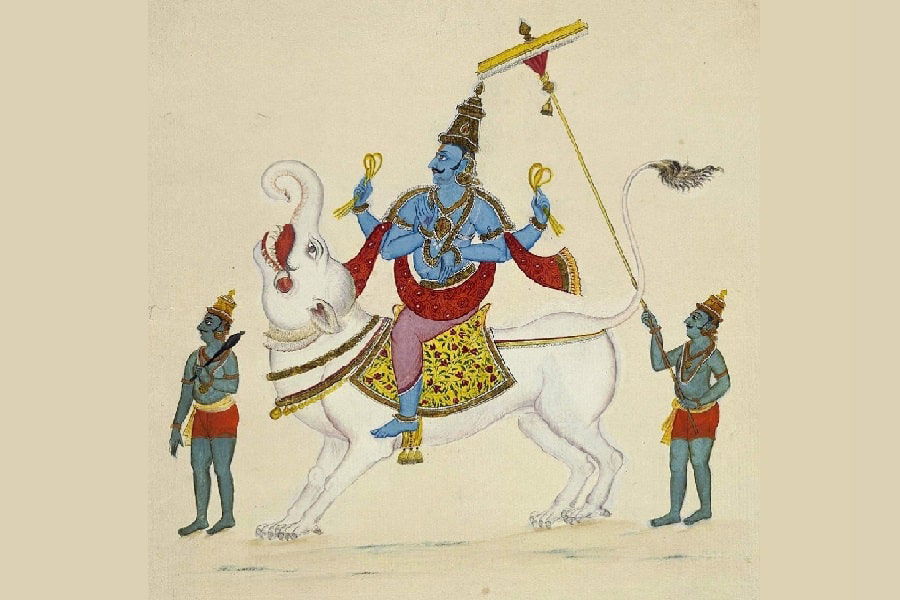
- Name: Lord Varuna
- Religion: Hinduism
- Realms: King of the universe, moral law, the ocean, clouds, wind, water, aquatic animals
- Fun fact: He has a thousand eyes
The first guest is, of course, a king riding a crocodile.
This is Lord Varanu, a Hindu sea god and monarch of the universe. But he’s not here to talk about constellations and planets. That’s for another party—erm, another conference. This is a conference.
Varuna is here to share his insight about water. He certainly has the agency to do so, he oversees all the seas, rivers, and the animals in them. Plus he can also control the rain, which could be why he’s sometimes shown with an umbrella.
This sea god is among the oldest Vedic deities. With his limitless power and knowledge, he can easily ferret out the sinners. Unlike Ganga, though, he’s swift to punish law-breakers. But, at the same time, this four-armed guy — who is waving a noose around for some godforsaken reason — is not unreasonable. When a person regrets their wrongdoing and prays, he forgives them.
Egyptian Water Gods
The premier civilization in North Africa and the Mediterranean from c. 2500 -700 BC (READ: Ancient Egypt timeline), the Egyptians were a deeply religious people who were also keenly aware of the connection between water (the Nile River) and their survival. Of the many Egyptian gods and goddesses, there are several water and sea gods.
Anuket — Goddess of the Nile
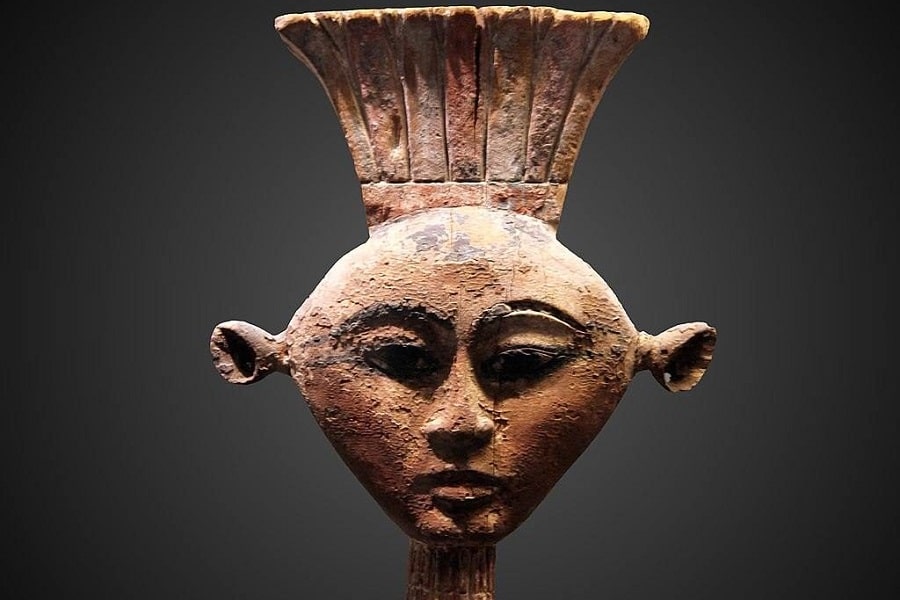
- Religion: Egyptian Mythology
- Realms: Goddess of the Nile, hunting, and childbirth
- Family: In some versions of mythology, she was the daughter of Ra
- Fun fact: One of her roles was to suckle the pharaoh
Lord Varuna takes the last of the banana puffs with his twenty fingers. With that, your job at the door is done and another arrival clicks her fingers at you in the dainty, yet authoritative, manner of high-class ladies summoning a porter.
She wants you to carry her luggage poolside, and that is no easy task. Her bags are full of solid gold. This is Anuket, an Egyptian goddess of the Nile and during ancient times, people hurled precious metal into the river to appease her. Apparently, they hurled a lot — honestly, she looks a little bruised from being hit by all the bracelets and gold cat statues.
As a water goddess, Anuket is one of three deities who guard the Nile and its source — with her specifically keeping watch over the lower cataracts near Aswan. This position highlighted her importance to the ancient Egyptians since the river was the lifeline of thousands.
READ MORE: Ancient Egypt Timeline: Predynastic Period Until the Persian Conquest
Interestingly, though, she didn’t bum around her section — this girl wanted to travel. And in a sense she did, because Anuket was also the goddess of water in nearby Nubia and Sudan.
Tefnut — Goddess of Rain
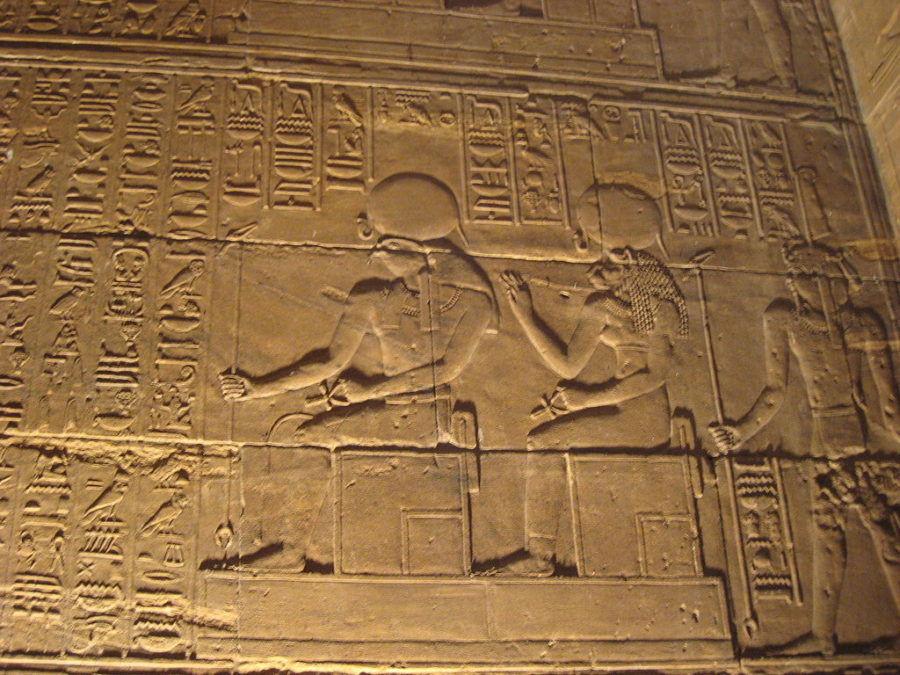
- Religion: Egyptian Mythology
- Realms: Goddess of rain, Egyptian Sun god, and the Moon
- Family: Married to her twin brother Shu; mother of Geb and Nut
- Fun fact: Among all Egypt’s water deities, Tefnut was perhaps the most important (Egyptians believed that without her, their lands would dry up completely)
You’re ordered to go to the VIP box and help a water goddess with her makeup. This seems a little hoity-toity, but Tefnut is a product of her history. She was an exceptionally important deity to the Egyptians. As such, she wasn’t worthy of the common gaze. The grassroots only saw her during festival parades (or rather, a temple statue made in her image).
But, before she could appear in public, priests always washed and oiled “Tefnut.” She was dressed in the best linen and her forehead was anointed with sacred oil.
You stand before the goddess of water, who brought all the rain to Egypt. Hoping that she’s not telepathic as well, you think how bizarre she looks with the head of a lioness and the body of a woman. I’m not washing that thing, you think.
READ MORE: Egyptian Cat Gods: Feline Deities of Ancient Egypt
Luckily, her own priests are present and have already done the deed. All you have to do is smear some oil on that lion’s frown and get out of her temple — which was also the only place where she ever dwelled, back in ancient Egypt.
READ MORE: Cat Gods: 7 Feline Deities from Ancient Cultures
Chinese Sea Gods
Another ancient religion with lots of deities, there were several Chinese gods and goddesses in charge of the water and sea.
Mazu — Chinese Goddess of the Sea
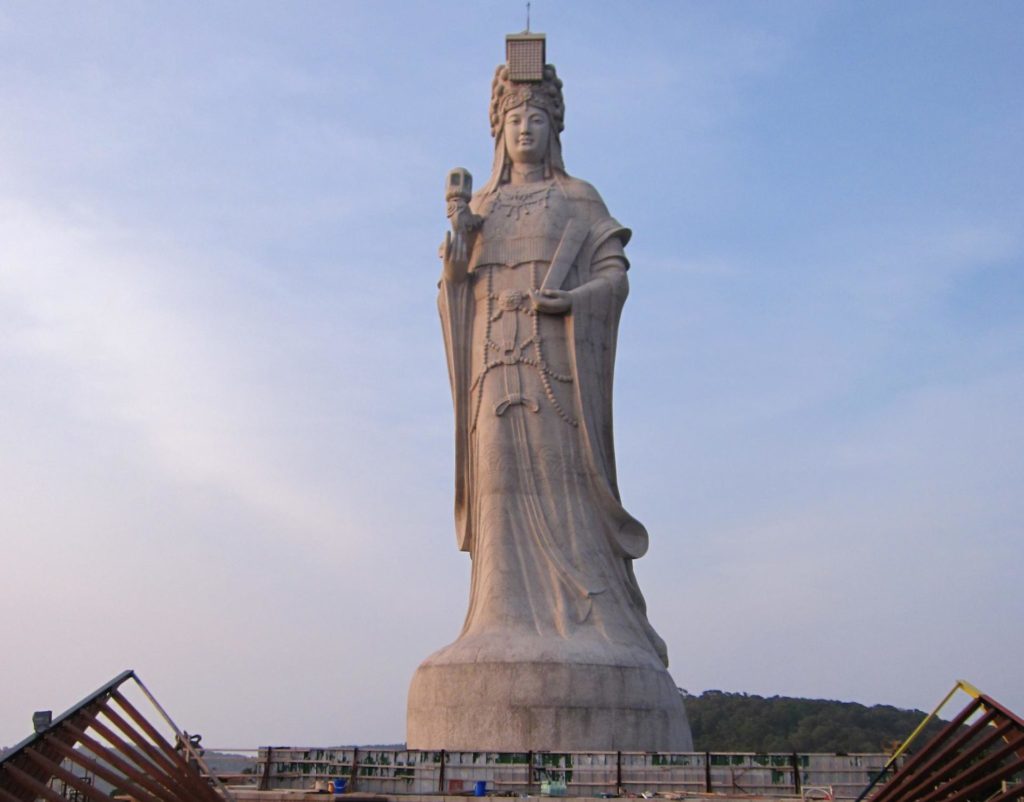
- Religion: Ancient Chinese Mythology
- Realms: A mother goddess; the sea
- Family: Born to mortal parents; has five brothers
- Fun fact: Globally, there are almost 1,500 temples dedicated to Mazu
A lady ushers you away. She is Mazu, the Chinese sea goddess. Her kindness to people is well-known and, even today, her name is used to summon help. In the past, she was gifted with prophecy and warned sailors of bad weather.
Mazu didn’t remove you from the barbeque grill just to get you away from that poor fish — she also needs a lifeguard to join her crew.
You learn that Mazu, like Glaucus, had been born human. But she didn’t become a sea god after suffering an herbal blooper — her transformation started when she turned out to be a child prodigy. By the time she was ten years old, Mazu had mastered many Buddhist and Daoist secrets.
As a teenager, she was a Kung Fu master, performed miracles, and dedicated herself to helping people. She had a particular soft spot for fishermen in danger of drowning. And then, at age 28, she bid her parents farewell and disappeared.
People continued to see her in times of need. Many sailors claimed to have been saved by a glowing woman in a red dress warning them of an impending storm or from the many other dangers of the deep. To her followers, Mazu was no longer a mortal woman but the Buddhist goddess of water.
READ MORE: The 19 Most Important Buddhist Gods and The History of Buddhism
Her rescue skills, supercharged with prophecy, allow her to see which of the water deities in the pool are about to get into trouble. When she points at one, you pull them out by the neck with a shepherd’s crook. The tool’s not Mazu’s but hey, it works.
Mayan Sea Gods
Chac — Mayan God of Rain
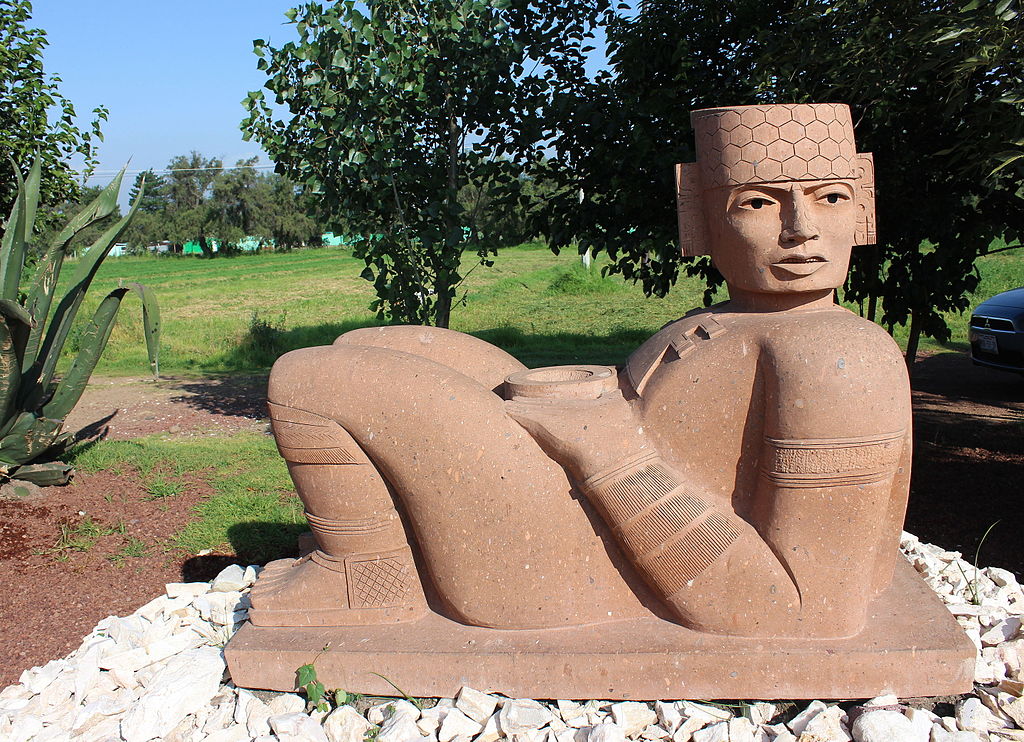
- Religion: Mayan Mythology
- Realms: The god of rain
- Fun fact: Chac can divide himself into four distinct gods, each representing a cardinal direction
On Mazu’s orders, you hook a water demon and haul the creature from the water. At first, you mistake the scale-covered figure — with its lolling tongue, fangs, and one seriously ugly elephantine nose — for a sea monster that somehow ended up in the pool.
Good thing you didn’t say anything because he’s a powerful Mayan god called Chac.
As it turns out, he had to be rescued because he’s not the swimming-in-the-sea kind of deity. While he is a god of water, Chac doesn’t control the oceans or rivers. His job is to make stormy weather and rain.
Chac, whose name means “red,” does this by throwing his ax into the sky. When the stone or jade weapon hits the clouds, the result is thunder and lightning, and when it collides with rain-carrying snakes, it pours fresh water.
Unfortunately, dry spells made the Mayans offer their kids as sacrifices. For this reason, he’s also one of the bloodiest water gods out there.
Aztec Water Gods
Tlaloc — Aztec God of Rain and Fertility
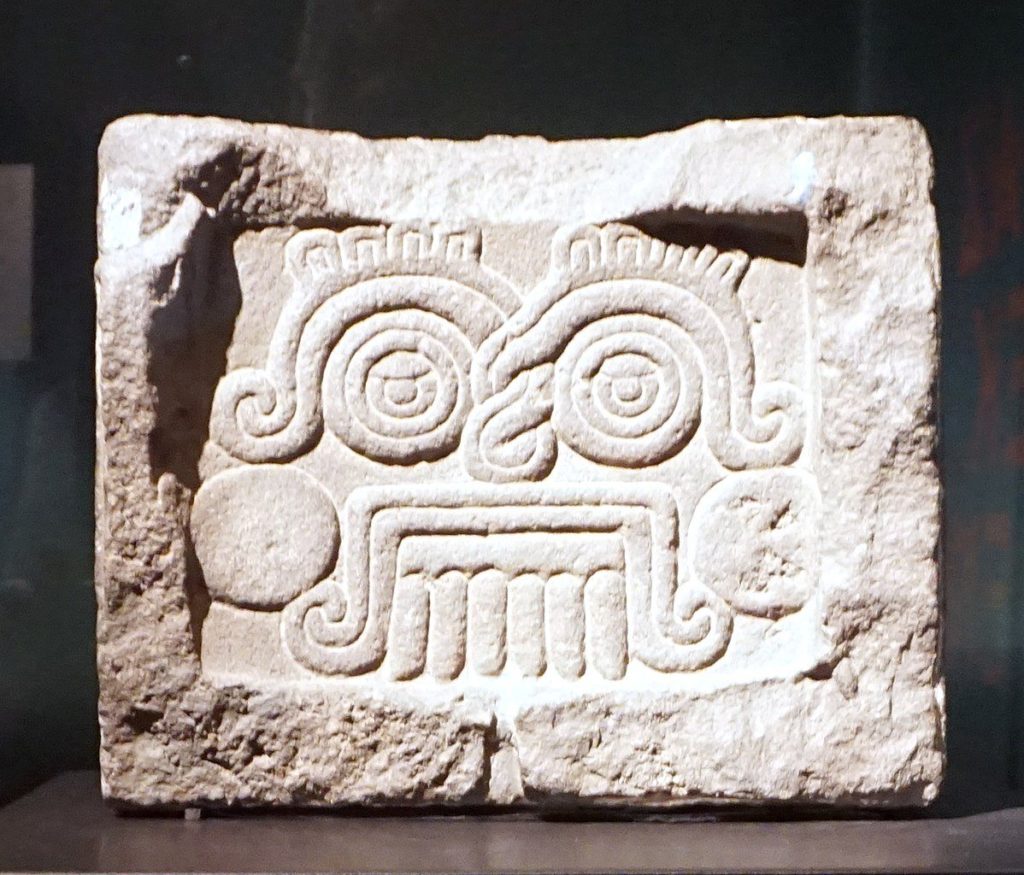
- Religion: Aztec mythology
- Realms: Rain, fertility, vegetation, lightning, thunder
- Family: Married to Chalchiuhtlicue
- Fun fact: He’s the Aztec version of Chac (whom you met earlier)
In central Mexico, the Aztecs called Chac by another name — Tlaloc. Appearance-wise, he doesn’t look much better, though he is one of the most revered of all the Aztec gods. Although he resembles a man, he has fangs like a jaguar and rings around his eyes. You’re a little tipsy from the beer tent, so you’re okay with the toothy Aztec god of rain.
He asks you to hold his four jugs while he changes into his swimwear. While you wait outside the dressing room, boredom makes you look inside them.
Respectively, they are filled with rain, frost, drought, and disease. Boldened by your blood alcohol level, you question Tlaloc when he exits the cubicle.
He shrugs and explains that he pours these things onto the world sometimes, just for funzies. In the past, he used the drought jug a little too much, once or twice. Then the people started sacrificing crying children, believing their tears would make him use the rain jug.
Yeah, that sobers you up quickly.
He’s still explaining about how Aztec heaven is named after him and how the souls of the dead are his sacred domain when you gratefully notice that you’re being summoned by a siren to bring her a seafood platter.
READ MORE: Aztec Religion
Afro-Caribbean Water Gods
Mami Wata — Goddess of Water
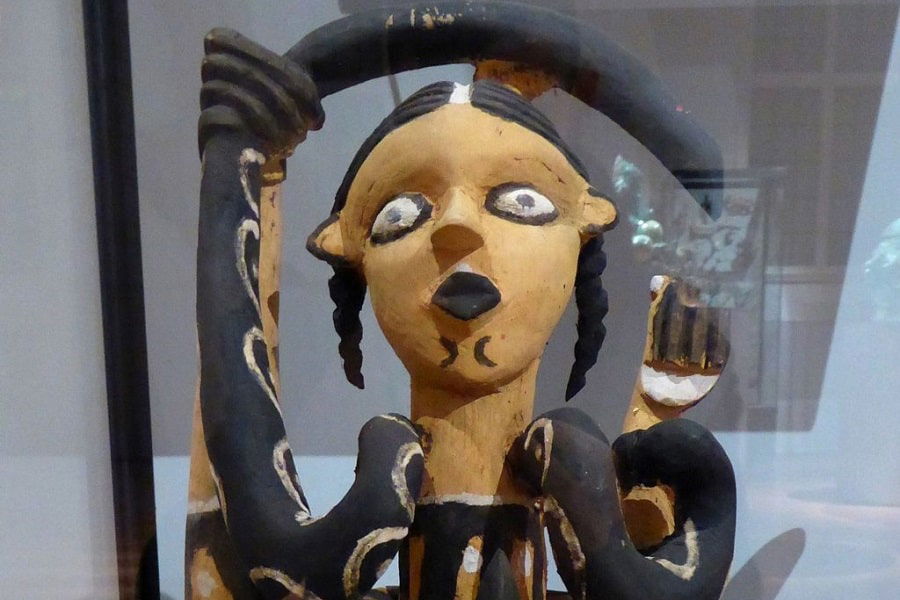
- Religion: Many
- Realms: Water
- Fun Fact: Her followers consume talcum powder to prepare themselves prior to worshipping at her altar
This water goddess is unique in several ways. She’s the only deity at the party who still has a large active following among humans — for the past 500 years, altars have popped up all over Africa, Brazil, the Caribbean, and the United States, all for her.
READ MORE: 12 African Gods and Goddesses: The Orisha Pantheon
Mami Wata is basically a mermaid. She’s lovely, certainly, but also very dangerous.
Curiously, this goddess of water is associated with money. Tick her off and your finances risk being ruined, but please her and your moolah might multiply. Alright, let’s be fair — she’s not technically a loan shark but in a way, many believe that her displeasure is real and her consequences acutely felt in the wallet. To win the favor of this goddess, one must aim for the nose.
Her followers bathe and scent themselves, and also perfume the air around her altar. Additional things that make Mami Wata so unusual are the fact that she’s also a snake charmer, and that her many physical forms have incorporated symbols from Hinduism and Christianity. According to experts, this religious crossover is an insurance policy for worshippers who are still attached to other faiths.
Maybe, when the end is nigh, having a goddess rooted in several faiths could be the best bet to survive the apocalypse. Looking around at the water deities and their wild party, things seem to be heading way. Hhm. Maybe Amazon sells Mami Wata altars?
Begone, Mortal. The Water Sea Gods are Done With You
Just like that, the gods dismiss all the humans at the party, and you reappear in your living room from whence you were nabbed in the first place.
There’s some heaviness to your pockets and upon investigation, you discover that you weren’t forced into a free shift after all — the water gods had paid for your time with a gold Egyptian statue, a Tupperware bowl full of banana puffs, and a dollar from Mami Wata (maybe not the best insurance policy after all).
You’ve met only fourteen water gods, but this group highlights the fascinating niche of gods that preside over wet stuff. Water remains the force of life and, during ancient times, the lack thereof could push an entire civilization over the edge. This is why aquatic deities — across very different cultures from all over the world — all rank among the most powerful gods and goddesses.
READ MORE: Ancient Civilizations Timeline: 16 Oldest Known Cultures From Around The World
And if one tips you a dollar, hey, that’s not the worst thing they could do!
A dream I had lead me to google water deities and this article danced around so many details of that dream. Thank you to the writer for this publication